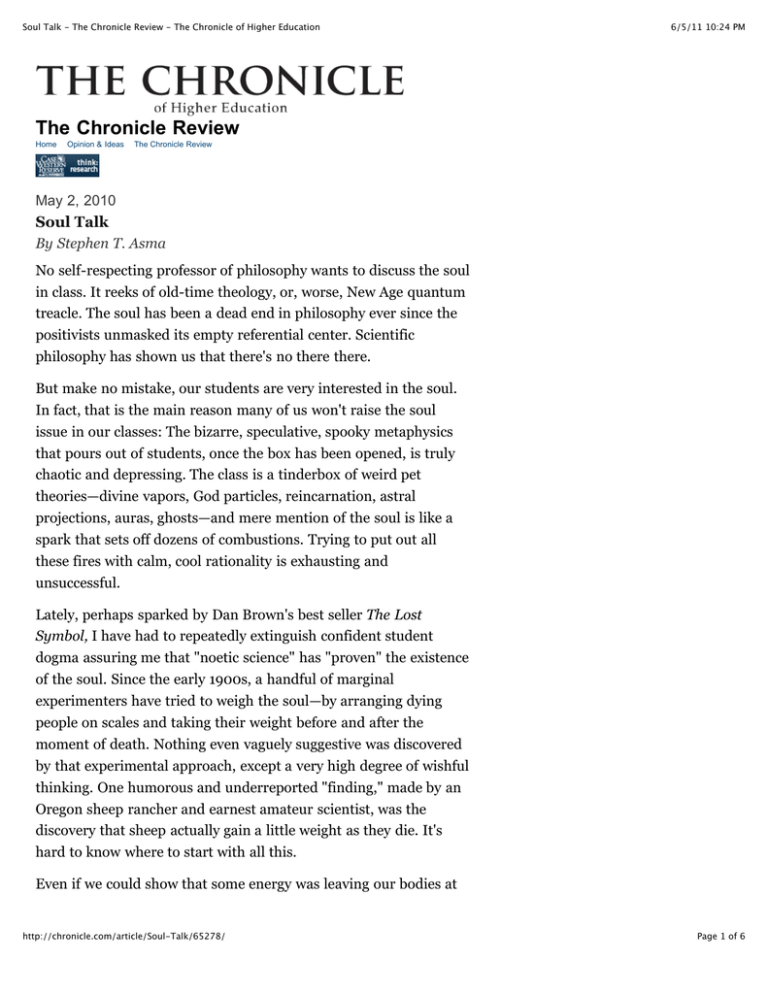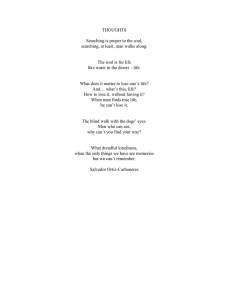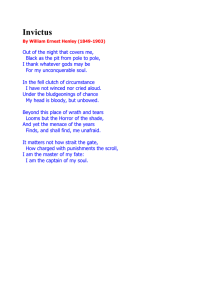
Soul Talk - The Chronicle Review - The Chronicle of Higher Education
6/5/11 10:24 PM
The Chronicle Review
Home
Opinion & Ideas
The Chronicle Review
May 2, 2010
Soul Talk
By Stephen T. Asma
No self-respecting professor of philosophy wants to discuss the soul
in class. It reeks of old-time theology, or, worse, New Age quantum
treacle. The soul has been a dead end in philosophy ever since the
positivists unmasked its empty referential center. Scientific
philosophy has shown us that there's no there there.
But make no mistake, our students are very interested in the soul.
In fact, that is the main reason many of us won't raise the soul
issue in our classes: The bizarre, speculative, spooky metaphysics
that pours out of students, once the box has been opened, is truly
chaotic and depressing. The class is a tinderbox of weird pet
theories—divine vapors, God particles, reincarnation, astral
projections, auras, ghosts—and mere mention of the soul is like a
spark that sets off dozens of combustions. Trying to put out all
these fires with calm, cool rationality is exhausting and
unsuccessful.
Lately, perhaps sparked by Dan Brown's best seller The Lost
Symbol, I have had to repeatedly extinguish confident student
dogma assuring me that "noetic science" has "proven" the existence
of the soul. Since the early 1900s, a handful of marginal
experimenters have tried to weigh the soul—by arranging dying
people on scales and taking their weight before and after the
moment of death. Nothing even vaguely suggestive was discovered
by that experimental approach, except a very high degree of wishful
thinking. One humorous and underreported "finding," made by an
Oregon sheep rancher and earnest amateur scientist, was the
discovery that sheep actually gain a little weight as they die. It's
hard to know where to start with all this.
Even if we could show that some energy was leaving our bodies at
http://chronicle.com/article/Soul-Talk/65278/
Page 1 of 6
Soul Talk - The Chronicle Review - The Chronicle of Higher Education
6/5/11 10:24 PM
the moment of death, it can't really be a surprise, since
thermodynamics tells us that energy is always being exchanged
through physical systems. When I die, the slowing of my
thermodynamic processes will become irreversible; my local
entropy will increase. When I die, my energy will go on. But, of
course, we can't get too excited by that fact, since we're talking only
about heat and the chemical transformation of my decaying flesh,
taken up and conserved in new organisms and physical systems.
The conservation of energy doesn't give us any conservation of
consciousness or any continuation of personal identity. And
personal continuity is the hope for most soul proponents.
But if we could set aside all the problems with these badly
controlled and executed experiments—if we could create highly
precise measurements—we would still have the more challenging
issue of coherence. Most people's concept of the soul includes the
idea that it is incorporeal or immaterial (this is how the religious
traditions have conceptualized it), so how could an incorporeal
entity have any weight or mass or volume, any of the spatial
properties we assign to matter? Thinking that the soul has weight
seems like a category mistake—like saying the number 4 weighs 30
pounds, or the color blue smells bad. Weighing the soul, or
searching for the soul in the brain, seems like a similar mistake.
Science seems entirely justified in its soul skepticism. But if such
speculative metaphysics is bracketed out of science, then what is
left of the soul issue? What remains of soul talk? Is it merely folk
language that has been replaced by more-accurate descriptions of
the human experience?
One response is for believers to rush headlong into a faith-based
rejection of rationality and just hold fast to the traditional soul
idea; another is to give it a New Age paint job with quantumenergy talk. Our students are very enticed by that response, partly
because they see no other avenue for preserving their meaningful
soul language. But lately I have been offering them a fresh
alternative.
Instead of asking whether we can verify the soul's existence—find
some empirical evidence for it—I suggest a Wittgensteinian
approach. Following the Austrian philosopher, I ask: How do
people actually talk about the soul? How is soul talk used in
http://chronicle.com/article/Soul-Talk/65278/
Page 2 of 6
Soul Talk - The Chronicle Review - The Chronicle of Higher Education
6/5/11 10:24 PM
ordinary language? And here we find that the soul is alive and well
in certain kinds of expressive language. When you look at actual
soul talk, you find the following kinds of expressions: "He is my
soul mate," or "She really sold her soul," or "That's good soul food,"
or "This nature hike is good for my soul," or "She is an old soul," or
"James Brown has soul," or "The soul reincarnates," or "Her soul is
in heaven now."
Those expressions share little similarity. Like Wittgenstein's
famous example of diverse "games," they probably represent a
family resemblance of meanings rather than a common essential
definition. Notice, for example, that only the last two expressions
have any metaphysical connotations.
But more important, the expressions are not really propositions
about the world. They express emotional attitudes and resemble
other kinds of imperative or aspirational speech, like, "You go,
girl!," or "Don't do that," or "Have a nice trip," or "I got soul, and
I'm superbad." When I say "You've got soul," it's not a description
of some factual state of affairs; rather it is an evaluation. It
expresses as much about the subject as the object referenced. We
cannot expunge the subjective expressive/evaluative properties
from the sentence and arrive at some testable proposition (as in
science). Saying "James Brown has soul" is nothing like saying "The
cat is on the mat" or "Water freezes at 32 degrees" or "The
amygdala plays a large role in memory." Those are all testable
propositions.
Soul talk is expressive in the same way as other nondescriptive
utterances, like "oh my God" or "ouch" or "yuck" or (with head
nodding to music) "Yeah, that's funky." There is no clear referent
for those. They don't seem to refer to or represent anything—they
seem somehow pre-representational (or presentational). Soul talk,
like other emotive talk, bears little relation to the goals of scientific
language, and probably can't be assessed with that language. Like
other expressive forms, soul talk in ordinary folk language won't
have much theoretical interest, because it is rarely, if ever, trying to
explain a phenomenon. In the same way that a poem is not trying
to explain a phenomenon, soul talk is equally uninterested in
induction, hypothesis, prediction, and corroboration. Instead, soul
talk tries to express our hopes and aspirations ("I hope I see my
http://chronicle.com/article/Soul-Talk/65278/
Page 3 of 6
Soul Talk - The Chronicle Review - The Chronicle of Higher Education
6/5/11 10:24 PM
family again in the afterlife") or to identify inspiration ("This song
really speaks to my soul"), or to express feelings deeper than
friendship ("I've finally found my soul mate"), or to scare people
into doing something ("Your soul will burn in hellfire"), and so on.
Moreover, the meaning of soul talk should not be searched for in
the correspondence theory of truth. When I try to establish the
meaning and the truth of the proposition "The cat is on the mat," I
attempt to find a correspondence between my word "cat" and the
actual feline animal, and my word "on" and the actual spatial
relation of said cat to mat, and so on. I'm looking for a
correspondence between propositions and the external world. In
that way I can verify the meaning and truth of my proposition.
But the sentences "James Brown has soul" and "My soul is
anchored in the Lord" rely on a very different system of meaning—
they don't correspond to anything particularly. Instead they take
their meaning from a coherence they have with other terms,
concepts, values, connotations, and associations. "This song has
soul" means: This music restores us, this music has integrity,
there's something authentic and natural in its style, this music
contains strong emotion, the repetition is hypnotic or ecstatic,
there are elements of the African-American experience in this
music and these lyrics, this song draws on gospel and R&B genres,
this song is so funky you can smell it, and so on. That is the matrix
of connotations that make up the context of soul talk—and the soul
talk is coherent to the extent that it coheres in some way with all
these other experiences and meanings. In that sense, the soul is
meaningful to many of us without any scientific verification of its
existence.
That is not the same as just having faith in the soul despite a lack of
evidence. I'm not suggesting that familiar view. What I'm
suggesting is more sly—the soul can be deeply meaningful whether
it exists or not, and it can be deeply meaningful even if you
disbelieve in its literal, metaphysical existence. That is not the
usefulness of fictions and delusions. It's the usefulness of an
expressive folk language that can't be replaced by a scientific
language.
So why is soul talk still meaningful, and why can't it be replaced?
http://chronicle.com/article/Soul-Talk/65278/
Page 4 of 6
Soul Talk - The Chronicle Review - The Chronicle of Higher Education
6/5/11 10:24 PM
If we think about the human being, we can analyze ourselves into
various parts and functions: the body, cognition, emotions,
memory, perception, and so on. And we can make many impressive
scientific claims about those parts and functions. Modern medicine
is a testament to the genius of methodological materialism and a
mechanical approach to the human being.
But in this matrix of human thoughts, feelings, and experiences, we
also find forms of awareness and activity that call out for a
different language. The kinds of awareness I'm thinking of might be
described as aesthetic—feelings of ecstasy, feelings for the beautiful
or the sublime, poignant stirrings that might be labeled
transcendent—or, negatively, feelings of horror or dread. And the
kinds of activities I'm trying to isolate might be creative acts
(playing music, writing poetry, handcrafting furniture, serving tea
while a Zen master whacks you with a stick) as well as ethical
activities (acts of altruism, self-sacrifice). It's hard to see how a
purely descriptive scientific language can find good traction in
those domains, but an alternative language exists and has existed
for a long time. Soul talk is a part of that successful expressive
language.
Philosophers like Wittgenstein, Heidegger, and Kenneth Burke
even went so far as to suggest that language is originally expressive,
rhetorical, and dramatic, and only derivatively descriptive,
scientific, and explanatory. If that is true, then soul talk is a part of
that primordial language.
Wittgenstein's focus on ordinary language shows where we can
preserve intelligent soul talk but avoid common category mistakes
and tendencies toward reification. We can "debug" soul talk. We
can detach it from its now unwarranted metaphysical history—and
we see this already in ordinary language when we say, "That singer
has soul" or "This nature hike is good for my soul."
But our tendency to turn this soul language into metaphysics is
strong—Wittgenstein said that sometimes "language goes on
holiday," and that we have to coax it back to its useful, functional
meaning. Just as I don't hear a smell or taste a color, I also don't
literally "live after death," or have a "soul mate." Those are
perfectly good metaphorical uses of language, but they shouldn't be
confused with literal descriptive uses of language. When I say, for
http://chronicle.com/article/Soul-Talk/65278/
Page 5 of 6
Soul Talk - The Chronicle Review - The Chronicle of Higher Education
6/5/11 10:24 PM
example, "My soul will go on," I'm probably really saying, "I hope I
live more." And when we've arrived at that naked expression of
subjective yearning, then we've probably reached the end of our
analysis. We're done understanding it.
The problem with some religious and New Age soul talk is that it
exports the soul concept from the domain of subjective expression
to the domain of objective fact, where it can have no empirical
corroboration. That is the main category mistake.
Many atheists, like Richard Dawkins, will criticize soul believers as
dimwits. And that is not my position. Everybody makes category
mistakes, and everybody confuses subjective yearning and hope
with objective matters of fact. Even the phrase "He is a dimwit" is
just an expressive claim masquerading as a descriptive claim.
Once you take the metaphysics out of the language of soul, you
begin to see how the soul is used in social contexts of ordinary
language. When a minister tells parents at their son's funeral that
they will see their son again, and his soul is in a better place, I
cannot dismiss it or heap scorn on it. If we professors hear this
language as a description of reality, then we're bound to be irritated
by the issue of truant evidence and the lack of warrant. But if we
hear it as emotive hope, then our objections fall away. The students
in my class are right to want to hold on to this language.
Metaphysics aside, the minister's language seems to suggest that
there are emotions so deep and bonds so strong that not even
death should end them. That is a beautiful sentiment no matter
what you think of the soul.
Stephen T. Asma is a professor of philosophy, and a fellow in the
School of Liberal Arts and Sciences Research Group in Mind,
Science, and Culture, at Columbia College Chicago. His books
include On Monsters: An Unnatural History of Our Worst Fears
(Oxford University Press, 2009) and Why I Am a Buddhist
(Hampton Roads Publishing Company, 2010).
Copyright 2011. All rights reserved.
The Chronicle of Higher Education 1255 Twenty-Third St, N.W. Washington, D.C. 20037
http://chronicle.com/article/Soul-Talk/65278/
Page 6 of 6





